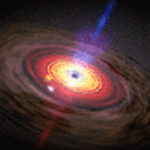The National Weather Service had issued a winter storm warning.
The film was a documentary, focusing on a topic many Kansans are just plain tired of hearing about.
(Above: The mastodon guards the entrance)
Still, 105 people from Hays and the surrounding area braved the threat of a blizzard to watch “Flock of Dodos” last night at Sternberg Museum, sponsored by FHSU’s Science and Mathematics Education Center. Refreshments were provided by Kansas Citizens for Science.
And although the promise of 8-12 inches of snow melted faster than a teenager can hit the snooze button, the film and the discussion afterward sparked dialogue that continued after the official “close” of the function.
The panelists, from left to right:
The evening’s moderator was Dr. Paul E. Adams, Professor of Physics and Anschutz Professor of Education at Ft. Hays State University. Paul began teaching astronomy at the age of 10 to budding astronauts in his neighborhood, and his passion for excellence in science education influences every facet of his work.
Andy Stanton has spent the past 10 years working in the advertising, public relations and marketing industries. His experience has taken him into the communication field involving the propane industry, Kansas K-12 educational public relations and Kansas tourism. Andy is an assistant professor of Communication Studies at Ft. Hays State University. Dr. Steven B. Case is the Associate Director and Research Assistant Professor at the Center for Research on Learning at the University of Kansas. Dr. Case was the co-chair of the Kansas Science Standards Writing Committee during the last adoption cycle.
Dr. Carl Miller holds a PhD in philosophy from the University of Georgia and a JD from George Washington University Law School; he’s an assistant professor of philosophy at FHSU. His philosophical research is largely inter-disciplinary, with interests in issues relating to science, especially evolutionary biology, and the scientific method, such as the nature and origin of the mind, the relation between science and religion, and the use of science in the law and ethics. Carl is also keenly interested in the issue of Constitutional interpretation and judicial activism. Dr. Loretta Dorn is an associate professor in the Chemistry Department at Ft. Hays State University. Loretta earned her BS (with honors) from Carnegie-Mellon in chemistry with a concentration in biochemistry, and her PhD at Brandeis focused on organic synthesis. Current research interests include a joint project relating the feeding behavior of lemurs to the nutritional value of the tamarind leaves upon which they feed.
Some questions posed to the panelists:
If evolutionists think we have evolved from apes, then where do they think apes come from? How do they think life initially began?
 Many of these questions were submitted by the students. It was enlightening to me as a teacher to be reminded that these young men and women are capable of thinking more deeply than adults sometimes realize. These are students who would relish a course in comparative religion or a basic philosophy class.
Many of these questions were submitted by the students. It was enlightening to me as a teacher to be reminded that these young men and women are capable of thinking more deeply than adults sometimes realize. These are students who would relish a course in comparative religion or a basic philosophy class.
 Although Case and Miller had a spirited discussion on the issue of Charles Darwin’s faith – or lack thereof – the evening was refreshingly civil. The adults in attendance proved to be excellent role models for the students who were present: the panelists expressed dissenting opinions without rudeness or rancor, and answered fairly pointed questions calmly and patiently.
Although Case and Miller had a spirited discussion on the issue of Charles Darwin’s faith – or lack thereof – the evening was refreshingly civil. The adults in attendance proved to be excellent role models for the students who were present: the panelists expressed dissenting opinions without rudeness or rancor, and answered fairly pointed questions calmly and patiently.
Props to the staffs of the FHSU Science & Mathematics Center and Sternberg Museum. Thanks also to Randy Olson for his support!
 At right: Dave Pollock, president of Kansas Association of Teachers of Science, just chillin' at the close.
At right: Dave Pollock, president of Kansas Association of Teachers of Science, just chillin' at the close.






